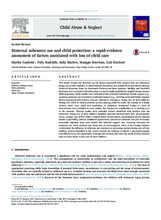Abstract
This article reviews the literature on the factors associated with mothers who use substances losing care of their children. A rapid evidence assessment was conducted in accordance with the Preferred Reporting Items for Systematic Reviews and Meta Analyses. Medline and PsycINFO databases were searched to identify primary research studies published in English during January 2000–September 2016. Studies were included if they presented individual, formal support (e.g., receiving substance use treatment) or informal support (e.g., receiving social and family support) factors associated with mothers who use substances retaining or losing care of their child/ren (losing care refers to child protection services placing child/ren under the custody of a family relative, foster care, child care institution, or adoption). Evaluation studies or trials of interventions were excluded as were studies that focused on reunification or re-entering care as the outcome. Thirteen studies were included. Factors associated with mothers who use substances losing care of their children included: maternal characteristics (low socioeconomic status, younger age of first child, criminal justice involvement); psychological factors (mental health co-morbidity, adverse childhood experiences); patterns of substance use (use of cocaine prenatally, injection drug use); formal and informal support (not receiving treatment for substance use, fewer prenatal care visits, lack of social support). There is not enough evidence to determine the influence of substance use treatment in preventing mothers losing care of their children. Factors identified in this review provide the evidence to inform a prevention agenda and afford services the opportunity to design interventions that meet the needs of those mothers who are more likely to lose care of their children.
To read the full article, please click the link above.

